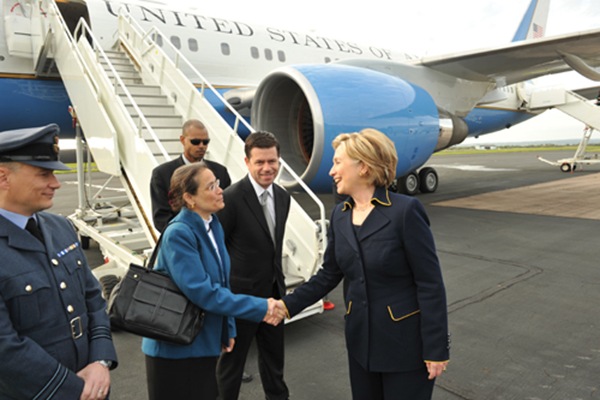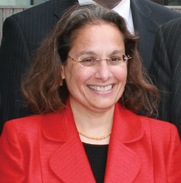Kamala Lakhdhir interview: special relationship
Eight months into her first European post, US Consul General Kamala Lakhdhir tells Meadhbh Monahan about her impressions of the province so far.
The phrase “special relationship” – which has long been used to describe relations between the UK and America – does not reflect the modern Anglo-American relationship, according to Parliament’s Foreign Affairs Committee. However, Kamala Lakhdhir insists that “whether you call it special or not you cannot ignore how much we share.”
America has had a consular presence in Belfast since 1796 and Lakhdhir reflects on the fact that before she arrived in the city she did not realise how “extensive” the relationship between Northern Ireland and the United States is.
“There is not a single person that I meet every day who has not gone to the United States, has family in United States, has a view, history or opinion of United States, or has studied in the United States.”
She says the connection between the region and America “is part of the fabric of life here.” Indeed, Irish-American contributions to the US economy have always been greatly appreciated.
In relation to the UK as a whole, Lakhdhir maintains that co-operation has been “very broad and deep” in the economy, defence, civic society and culture.
“We are neighbours, we are historic allies, indeed we are allies today, therefore I think our relationship is ‘special’. We have differences [such as] foreign policy where we disagree, but one of the things about the relationship is we can tell each other what we think. We can have a debate and we are very comfortable in doing that.”
Lakhdhir, who has been in the Foreign Service for 19 years, adds: “It’s a privilege
to work here and be part of that history and also to be part of maintaining and promoting it today. We certainly have a special relationship [with Northern Ireland].”
Ambitions
Since she arrived in September, Lakhdhir, has attended a whirlwind of events, aimed at building on the ties between Northern Ireland and America and supporting the consulate’s overall objectives.
These objectives fall into three broad areas. The first is to support and strengthen the political process that has evolved into devolution and the political institutions that have been created through the Good Friday and St Andrews Agreements.
The second is working with Economic Envoy Declan Kelly to develop the economy, inward investment and economic relationships, and promoting and expanding the province’s private sector.
The third broad objective, Lakhdhir outlines, is “working toward a pluralistic society where communities work together across all areas and integrate their efforts to the betterment of society.”
The consulate also organises networking events where people from the province get together to discuss the “substantive” topics of the day.
Martin Luther King Day on 18 January saw the consulate hosting 75 people who work in community relations and civic society from across the region. On International Women’s Day, 8 March, Lakhdhir oversaw discussions between women working in the justice sector, journalism and politics, many of whom knew each other but had never met.
“This is one of reasons I like working here,” Lakhdhir states. “So much work is being done by so many people.”
Consular staff establish meetings between local and American businesspeople so they can learn from each other. “There are many people in Northern Ireland who have expertise that we in the United States can learn from. It’s a mutually beneficial experience for both sides to be talking about what they [have learnt] in juvenile justice, environmental issues, [or] in bringing communities together after conflict.”
The consulate also works with the US Embassy in Dublin to promote island- wide projects such as the successful university exchange programme organised by the Irish Institute of Boston College.
Pre-conceptions
Prior to her post in Belfast, Lakhdhir held various posts in the Middle East and Asia including Beijing, Saudi Arabia, Indonesia and Taiwan. During that time she dealt with conflict and stalemate in political negotiations and came to the realisation that in societies where conflict has been part of their historical legacy, it is also “so much part of the discussion and debate of politics.”
Lakhdhir notes the North Korean nuclear talks, on which she spent four years, as a case in point. The argument over nuclear development in the country showed her the difficulties of negotiations. “[I realised] how hard it is to move forward politically; how language and history create a framework that you have to negotiate within; and sometimes creates great barriers to change.”
In Indonesia, Lakhdhir witnessed attempts by a country with “a very diverse society” and a mixture of ethnic and religious groups, to develop “a common identity.”
She came to realise that these “broad” issues can be translated onto Northern Ireland’s history of violence and conflict.
Lakhdhir learned about the province through Kathleen Stephens, Susan Elliott and Dean Pittman, three former consul generals.
“I had heard from them how dynamic and interesting working in Northern Ireland was, that there were challenges but people [here] were working very hard to transform their own society.”
From her experience of meeting such people, Lakhdhir praises them for trying to make change.
“In some of the societies we work in it’s much more pessimistic. People don’t have that hope that they can do something to make change, so the descriptions and discussions of what’s happening here was, for me, very exciting.”
As well as working in conflicted areas, Lakhdhir experienced tension in her own country following the September eleventh attacks.
She grew up in New York with an Indian Muslim father and a Christian mother, therefore, unlike many Americans, she
was familiar with the cultures and beliefs of the Muslim American community.
In the months and years following the collapse of the world trade centres, there was animosity towards the Muslim community in America. Commenting on this, Lakhdhir says: “This was a horrible shocking event and was a very challenging time for Americans. A lot of Americans had to learn about Muslim Americans and Islam. There was tremendous fear that there would be more attacks. There were fears of home grown- attacks. Americans were very challenged and maybe sometimes, we as a society failed in how we handled this.”
Lakhdhir points to the imprisonment of Japanese Americans during World War Two as an example of a similar historical event.
Every country, including Northern Ireland, has a history that must be analysed, Lakhdhir contends. She says that decisions have to be made as to whether what was done was acceptable or not. “Then, systems and legal frameworks must be established to ensure that we don’t make such mistakes in the future.”
An outdoors person, Lakhdhir enjoys cycling, sailing, kayaking and roller- blading, although she admits she hasn’t had the chance to roller-blade yet because of the rain. She also enjoys meeting people and that is where she finds the most job satisfaction.
“Part of being in Foreign Service is that the United States Government send you all over the world to meet courageous people. It’s really interesting work [because] every day you don’t know what will happen, who you’ll meet or what they’ll tell you.”
Born in Brooklyn, New York, Kamala graduated with a bachelor’s degree from Harvard College in 1986 and received a master’s degree from the National War College in 2007.
In 1991 she joined the Foreign Service, serving first in Riyadh, Saudi Arabia, and then in Jakarta, Indonesia. From there, she became deputy director of the department’s Taiwan co-ordination
staff, and from 2001 to 2005, she worked in Beijing. Prior to her Belfast post, Lakhdhir was Director of the Office of Maritime South East Asia in Bureau of East Asian and Pacific Affairs.







